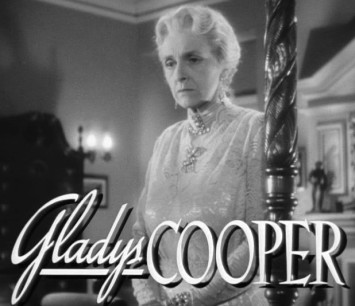
***This post is part of What a Character! Blogathon 2018, hosted by the Once Upon a Screen…, the Paula’s Cinema Club, and the Outspoken and Freckled blogs. ***
***Some spoilers***
“‘Retire? Whatever for?… Who cares how old I am? Who cares how long it was since I first played Peter Pan?’” (Gladys Cooper, as quoted in The New York Times, par 4)
If you read my contribution to the What a Character! Blogathon from last year, you know I love character actors. One thing that interests me about them is how many classic character actors began their film careers later in life (such as Monty Woolley and Ethel Barrymore), giving their talents first to the theater. Consequently, it’s hard to imagine they weren’t been born with the kind of acting experience it takes years to cultivate.

Photo Credit: Gladys Cooper, looking regal and lovely, in a fancy-dress costume. No date, but from the dress and hair style, probably from the 1910’s. Bain News Service, Library of Congress, Prints and Photographs Division: Wedg/Wikimedia Commons/PD Bain
I felt the same way about British character actress Gladys Cooper, having only seen her in films from the 1940’s onward when she was well into her 50’s. So imagine my shock and delight when I started seeing photos of her on Pinterest from the 1910’s as a strikingly lovely young woman with very long hair and a pouty, almost bored expression that you just want to lighten up with laughter. In an appearance on the Dick Cavett Show in the 1970’s, Bette Davis (who worked with Cooper numerous times in the 1940’s) pointed out how Cooper had been for a long time in her youth “all the rage” in London, a trend-setter and even a pin-up girl of sorts for British soldiers in World War I. Her obituary in the New York Times declares, “Miss Cooper’s cool, aristocratic beauty and lovely voice stayed with her throughout her life, and to millions her porcelain features became the standard beside which British womanhood was judged” (New York Times, par 5).
This is in stark contrast to some of her best-known roles where she played the staunch, unyielding and unsympathetic matriarch. The pouty, bored expression in her youth gives way to seething torturous gazes in films such as 1942’s Now, Voyager and 1958’s Separate Tables. Kerry Fristoe, in her discussion of both films, points out the two mothers Cooper plays in these films, though very different in many ways, “are grasping and haughty and dismissive of all other points of view” (Fristoe, par. 6).

Photo Credit: Gladys Cooper from the Now, Voyager (1942) trailer, cropped image. Now, Voyager trailer, trailer screenshot, 1942: Rossrs-commonswiki/Wikimedia Commons/PD US no notice
But Cooper’s stage experience lends much more subtle psychology to Now, Voyager’s Mrs. Henry Vale and Separate Table’s Mrs. Railton-Bell. Emotional manipulation and emotional vulnerability meet in Cooper’s expressions, in her voice, her words, even her manner of sitting and standing. The daughters of both these women, Charlotte Vale (Bette Davis) and Sibyl Railton-Bell (Deborah Kerr) wither in her presence as do everyone else. Indeed, both mothers engage in what we now know is emotional abuse, psychologically crippling the daughters so they will stay with her and take care of her throughout her life. It is in fact her own emotional needs — to be protected from the big, bad world — that become reflected on the daughters. In other words, “Gladys Cooper plays women who dominate their daughters, preventing them from maturing into adult women. In both films, her characters keep their daughters bound to them, not out of love, but out of a fear of loneliness” (Fristoe, par. 6). This kind of towering personality fits Cooper’s regal demeanor very well. Although she played other characters in her career, some of them quite likable (like the blunt but sympathetic sister to Maxim de Winter in Hitchcock’s Rebecca (1940)), I think her best roles were those that required a duality and a combination of psychological insight and emotion. These gave depth not only to the matriarchs she played but also the daughters who played opposite her. It makes the autonomy that both daughters establish at the end of the films that much more meaningful.
Although Cooper’s matriarchs are not ones you would want to encounter in a dark alley on a moonless night, her off-screen persona was quite different. Those who knew her well have nothing but praise for her. Davis called her a “beautiful woman” over and over again in the Cavett interview, expressing true remorse that Cooper had died the day before the interview, lamenting that we would never see the likes of her or Claude Raines, “individuals”, again in film. Actor Robert Morley (for a discussion of Morley’s sharp-witted performance in the food comedy Who is Killing the Great Chefs of Europe?, see here) who was also Cooper’s son-in-law broke away from his usual droll, eccentric sense of humor when Cooper showed up during his turn on the Dick Cavett Show. He calls her an excellent grandmother who was “very keen on manners” and the banter between them is good-natured and warm. In contrast to Cooper’s unsmiling matriarchs in the two films mentioned above, Cooper gives us a lot of laughs and smiles in this interview and is overall so charming and witty and wise that it’s easy to see why she was “all the rage” in Britain for so many years.
Works Cited
Fristoe, Kerry. “Mommie Not-So-Dearest: Gladys Cooper in ’Now, Voyager’ and ‘Separate Tables’.” Brattle Theater Film Notes. The Brattle Theater, Brattle Film Foundation. 24 August 2018. Web. 12 December 2018.
“Gladys Cooper, British Actress, Dies.” The New York Times. The New York Times Company, 2018. 18 November 1971. Web. 12 December 2018.

Never has Cooper’s hauteur been on better display than in THAT HAMILTON WOMAN, where she portrays Lord Nelson’s vengeful wife. Thanks for the info on her past life…kind of shocking.
LikeLike
Hi Paula! Thank you for your comment. I agree with you that Cooper in That Hamilton Woman is a sight to see (though not a maternal figure). She’s downright scary :-). Tam
LikeLiked by 1 person
Gladys Cooper’s film roles are as impressive as her history in the theatre. You could not have chosen a better subject for this year’s blogathon.
LikeLike
Thanks, Patricia! I agree that her film career was very impressive and she kept at it until her death in 1971. Tam
LikeLike
I like what you said about her regal bearing, and also your observation of the emotion and insight she brought to her roles. I’d never thought about it this way before, but I agree that her approach brought depth not only to her character, but to those characters interacting with her.
LikeLike
Thanks so much! I also didn’t think about the give-and-take between Cooper and the daughters in the films until I scrutinized these two films more. I’ve seen them over and over again but that’s the beauty of classic films – you get something new out of them every time :-). Tam
LikeLiked by 1 person
I enjoyed your piece on Cooper immensely! She is such a complex actress, every performance is an intense psychological trip. Even as Sister Marie Theresa in The Song of Bernadette (1943) or her nasty mother-in-law to Anne Francis in Alfred Hitchcock Hour’s What Really Happened, not to mention the heart wrenching duality of a bitter old women who is lonely and longing in The Twilight Zone’s Night Call. I heard that she had been a great beauty in on the British stage! I can believe it. She has a regal quality to her. Thanks so much for this enjoyable read! Cheers, Joey
LikeLike
Thanks so much, Joey! I couldn’t agree with you more about Cooper. She’s one of my favorite character actors :-).
Tam
LikeLiked by 1 person
How interesting! I remember her best from Now, Voyager, and I couldn’t imagine she had such a colorful past. As for acting range, it’s clear that she had it, being as believable as either sympathetic or unsympathetic characters. Great research.
LikeLike
Thanks so much for your comments! I agree that Cooper was believable as sympathetic and unsympathetic characters. I loved her as Max DeWinter’s sister in Rebecca. She was pretty much the only one who was friendly from the get-go to the young wife :-).
Tam
LikeLike
I too remember being shocked the first time I discovered pictures of a young Gladys Cooper. Could that possibly be the cool, remote presence I experiences on screen? I love hearing how Davis and Morley remembered her. It just goes to show, that we can’t judge a public figure by their persona.
LikeLike
Thanks so much for your comments! I also loved hearing what Davis and Morley had to say, especially Morley, since his humor makes it difficult to know what to believe from him :-). But he was very sincere about his affection for Cooper.
Tam
LikeLike